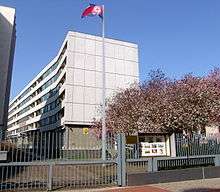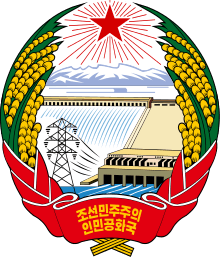Germany–North Korea relations
.svg.png) |
|
Germany |
North Korea |
|---|---|

Germany–North Korea relations are the bilateral relations between Germany and North Korea. During the Cold War, East Germany maintained diplomatic relations only with North Korea, while West Germany maintained diplomatic relations only with South Korea. East Germany ceased to exist upon German reunification, which meant that diplomatic relations no longer existed between Germany and North Korea. The two countries appointed protecting powers to represent their interests in the other country, Sweden being the protecting power for Germany, and China being the protecting power for North Korea.[1]
Germany and North Korea established diplomatic relations with each other in 2001.[1] The German embassy in Pyongyang remains in the old East German embassy compound, which is now shared with the Swedish and British embassies.
Since the establishment of diplomatic relations, there have been no visits of government delegations at ministerial level to Germany or North Korea. However, there have been several official visits to North Korea by members of the German Bundestag.
According to a 2013 BBC World Service Poll, only 3% of Germans view North Korea's influence positively, with 90% expressing a negative view, one of the most negative perceptions of North Korea in the world.[2]
History
The very first bilateral relations between the once not divided united Korea under the Joseon-Dynasty and Germany were held trough negotiations for a German-Korean trade relationship. The so called German-Treaty of 1883 was signed and the first official connections on governmental level between the two countries was for economical reasons.
After the second world war, Korea was split into two parts: North- and South Korea. The communist north under Kim Il-sung established during the Cold War diplomatic relationship with former East Germany (GDR), right after the foundation of the Democratic People's Republic of Korea (DPRK) on September 9 in 1948 [3]
Former East Germany under the Soviets seek connections for trade, educational exchange and manifestations as a Communist power with the Asian country. After the former USSR and the PRC, the GDR was the thirdbiggest provider of money to Korea, to fight the capitalism, in the communist way of thinking it was clear to help loyal friends in any ways which can be imagined.
After the Sino-Soviet split in 1960, North Korea was loyal for Mao, but East Germany reached grew closer with the Soviet Union. Because of that the once blooming close interrelation came to a stagnation. For example a lot of North Korean exchange students, which studied at Universities in East Germany had to go back in 1962 to their homecountry. Some North Korean students were engaged or married with some German students or other young woman and already had children with them. So even if these relationshisp were prohibited. After the separation of this more or less forbidden lovers, the children stayed by their mothers in Germany and grew up in the GDR, whilst their fathers had to go back to North Korea. The majority of the Germans saw their father, husband or lover never again. The German-Korean director Sung Hyung-cho made a film about the German-Korean familys in 2015.[4][5]
After the collapse of the Soviet Union, the German Embassy had to be closed up to this point of the reunification of both Germanys and “at the same time, the former North Korean Embassy in East Berlin was turned into an Office for the Protection of the Interests of the Democratic People’s Republic of Korea, with the People’s Republic of China acting as protecting power. The Federal Republic of Germany and North Korea established diplomatic relations on 1 March 2001”.[6]
German embassy in Pyongyang
Ten years later when the German Embassy in Pyongyang was reestablished, Germany tried to bring North Korea to the six-party talks to discuss about the problematic with the nuclear weapons program of North Korea. Due to the recent nuclear tests in January, February and September 2016, Germany prompt sanctions, and followed the UN and European Union. Of course, this has an effect to the bilateral relations between both countries, which means no more shipping of luxury goods or including arms embargo. Also complete prohibition of foreign trade and other sanctions which could influence the expansion of further nuclear tests.[7]
But before the harsh international answer to the forbidden test of missles and nuclear weapons in North Korea, Germany was seeking for a peaceful exchange with providing education on terms of scholarships for Korean students or bringing the German language to Korea. Therefore Germany provides a position for a german lecturer with help from the German Academic Exchange Service (DAAD) at the Kim Il-sung University. Already in the eighties, two constantly lecturer were at the university to teach German and close relations existed with the section of the Korean Studies at the Humboldt University in Berlin. Since then a lot of North Koreans (elite) could visit Germany and profit from the cultural exchange.
One reason was because of the sunshinepolicy of the former Southkorean president Kim Dae-jung, a new and better diplomatic relationship with North Korea and few EU members were possible so that Germany as a cultural nation could set projects with for example the Goethe-Institute.[8] Because of UN-sanctions Germany can recently not host North Korean researchers for example engineers or scientists.[9]
North Korean embassy in Berlin
After the readmission of the diplomatic bilateral relations between North Korea and German like Germany did in Pyongyang, North Korea also moved back to their old embassy building in Berlin which they already used in the former times when Germany was still divided. In 2006 selected former ambassador of the Democratic People’s republic of Korea Hong Chang-il was replaced in 2011 by the current ambassador Hong Ri-si in 2011.[10]
The once whole used building for the North Koreans represents is only partly used for the embassy. The official building moved to the Glinkastrasse 5-7 in Berlin, so the other parts of this building nowadays is used among other things as a hostel for tourists.
Projects and bilateral relations between DPRK and the GFR is limited and difficult to realize due to the critical situation in the DPRK. Projects like those from the Goethe-Institut in Pyongyang are hard to continue under old conditions or rather better circumstances than before due the strict observations of the government of the DPRK, which controls information coming in and out of North Korea. The reactions of this human rights abuse in terms of UN-sanctions also make it difficult to maintain relations in cultural, economical and educational level. The recent nuclear tests and provocations of North Korea with violation of the international law makes it difficult to go ahead with peaceful rapprochement even with Track II diplomacy.
References
- 1 2 "Bilateral Relations, Korea (Democratic People's Republic of)". Federal Foreign Office (Germany). April 2015.
- ↑ 2013 World Service Poll BBC
- ↑ http://www.auswaertiges-amt.de/EN/Aussenpolitik/Laender/Laenderinfos/01-Nodes/KoreaDemokratischeVolksrepublik_node.html. Missing or empty
|title=(help) - ↑ [(2) http://www.spiegel.de/kultur/kino/nordkoreaner-in-der-ddr-doku-verliebt-verlobt-verloren-a-1040397.html (2) http://www.spiegel.de/kultur/kino/nordkoreaner-in-der-ddr-doku-verliebt-verlobt-verloren-a-1040397.html] Check
|url=value (help). horizontal tab character in|url=at position 4 (help); Missing or empty|title=(help) - ↑ http://www.verliebtverlobtverloren.de/. Missing or empty
|title=(help) - ↑ [(4) http://www.auswaertiges-amt.de/EN/Aussenpolitik/Laender/Laenderinfos/01-Nodes/KoreaDemokratischeVolksrepublik_node.html (4) http://www.auswaertiges-amt.de/EN/Aussenpolitik/Laender/Laenderinfos/01-Nodes/KoreaDemokratischeVolksrepublik_node.html] Check
|url=value (help). horizontal tab character in|url=at position 4 (help); Missing or empty|title=(help) - ↑ https://www.wko.at/Content.Node/service/aussenwirtschaft/fhp/Embargos/Aktueller_Stand_der_Sanktionen_gegen_Nord-Korea.html. Missing or empty
|title=(help) - ↑ Moeskes, Christoph(Ed.), (2013). Nordkorea. Einblicke in ein rätselhaftes Land. Ch.Links.
- ↑ http://www.auswaertiges-amt.de/EN/Aussenpolitik/Laender/Laenderinfos/01-Laender/KoreaDemocraticPeoplesRepublicOf.html?nnm=479780. Missing or empty
|title=(help) - ↑ [(8) http://www.embassypages.com/missions/embassy17682 (8) http://www.embassypages.com/missions/embassy17682] Check
|url=value (help). horizontal tab character in|url=at position 4 (help); Missing or empty|title=(help)

